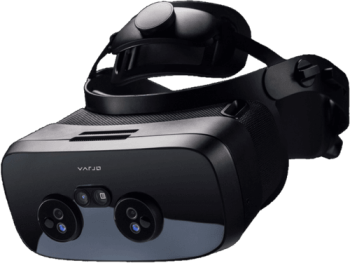Varjo XR-3: Difference between revisions
Xinreality (talk | contribs) Created page with "{{Device Infobox |image = 300px |VR/AR = Mixed Reality |Type = Head-mounted display |Subtype = PC-Powered AR |Platform = SteamVR, OpenXR |Creator = Varjo Technologies |Developer = Varjo Technologies |Manufacturer = Varjo Technologies |Announcement Date = December 1, 2020 |Release Date = December 2020 |Price = $5,495 + $1,495/year subscription |Website = https://varjo.com |Versions = XR-3, XR-3 Focal Edition |Requires..." |
Xinreality (talk | contribs) Tag: Undo |
||
| (9 intermediate revisions by 2 users not shown) | |||
| Line 1: | Line 1: | ||
{{Device Infobox | {{Device Infobox | ||
|image = [[File: | |image = [[File:Varjo xr-31.png|350px]] | ||
|VR/AR = Mixed Reality | |VR/AR = [[Mixed Reality]], [[Virtual Reality]] | ||
|Type = Head-mounted display | |Type = [[Head-mounted display]] | ||
|Subtype = PC-Powered | |Subtype = [[PC-Powered VR]] | ||
|Platform = SteamVR, OpenXR | |Platform = [[SteamVR]], [[OpenXR]] | ||
|Creator = | |Creator = | ||
|Developer = [[Varjo | |Developer = [[Varjo]] | ||
|Manufacturer = [[Varjo | |Manufacturer = [[Varjo]] | ||
|Announcement Date = December 1, 2020 | |Announcement Date = December 1, 2020 | ||
|Release Date = December 2020 | |Release Date = December 2020 | ||
| Line 14: | Line 14: | ||
|Versions = XR-3, XR-3 Focal Edition | |Versions = XR-3, XR-3 Focal Edition | ||
|Requires = High-end PC | |Requires = High-end PC | ||
|Predecessor = [[Varjo XR-1 | |Predecessor = [[Varjo XR-1 (Developer Edition)]] | ||
|Successor = [[Varjo XR-4]] | |Successor = [[Varjo XR-4]] | ||
|Operating System = Windows 10/11 (64-bit) | |Operating System = Windows 10/11 (64-bit) | ||
|Chipset = | |Chipset = | ||
|CPU = | |CPU = | ||
|GPU = | |GPU = | ||
|HPU = | |HPU = | ||
|Storage = | |Storage = | ||
|Memory = | |Memory = | ||
|SD Card Slot = No | |SD Card Slot = No | ||
|Display = uOLED (focus) + LCD (peripheral) | |Display = uOLED (focus) + LCD (peripheral) | ||
| Line 37: | Line 37: | ||
|Visible FoV = 115° | |Visible FoV = 115° | ||
|Rendered FoV = 115° | |Rendered FoV = 115° | ||
|Binocular Overlap = | |Binocular Overlap = less than 85% | ||
|Average Pixel Density = N/A | |Average Pixel Density = N/A | ||
|Peak Pixel Density = 70+ PPD | |Peak Pixel Density = 70+ PPD | ||
| Line 50: | Line 50: | ||
|Base Stations = Optional | |Base Stations = Optional | ||
|Eye Tracking = Yes (200Hz) | |Eye Tracking = Yes (200Hz) | ||
|Face Tracking = | |Face Tracking = | ||
|Hand Tracking = Yes (Ultraleap Gemini) | |Hand Tracking = Yes (Ultraleap Gemini) | ||
|Body Tracking = | |Body Tracking = | ||
|Rotational Tracking = 6DOF | |Rotational Tracking = 6DOF | ||
|Positional Tracking = 6DOF | |Positional Tracking = 6DOF | ||
| Line 58: | Line 58: | ||
|Tracking Volume = Up to 10m × 10m | |Tracking Volume = Up to 10m × 10m | ||
|Play Space = Room-scale | |Play Space = Room-scale | ||
|Latency = | |Latency = less than 20ms (VR), less than 20ms (passthrough) | ||
|Audio = Off-ear speakers (37mm drivers) | |Audio = Off-ear speakers (37mm drivers) | ||
|Microphone = Yes | |Microphone = Yes | ||
| Line 66: | Line 66: | ||
|Ports = 1× DisplayPort 1.4, 1× USB-C 3.0 | |Ports = 1× DisplayPort 1.4, 1× USB-C 3.0 | ||
|Wired Video = DisplayPort 1.4 | |Wired Video = DisplayPort 1.4 | ||
|Wireless Video = | |Wireless Video = | ||
|WiFi = | |WiFi = | ||
|Bluetooth = | |Bluetooth = | ||
|Power = External power adapter | |Power = External power adapter | ||
|Battery Capacity = | |Battery Capacity = | ||
|Battery Life = | |Battery Life = | ||
|Charge Time = | |Charge Time = | ||
|Dimensions = | |Dimensions = | ||
|Weight = 594g (headset only) | |Weight = 594g (headset only) | ||
|Material = Magnesium alloy, plastic | |Material = Magnesium alloy, plastic | ||
| Line 82: | Line 82: | ||
|Input = Compatible with SteamVR controllers | |Input = Compatible with SteamVR controllers | ||
|Compliance = CE, FCC, TAA-compliant option | |Compliance = CE, FCC, TAA-compliant option | ||
|Size = | |Size = | ||
|Cable Length = 5 meters | |Cable Length = 5 meters | ||
}} | }} | ||
The [[Varjo XR-3]] is a professional [[PC-Powered VR|PC-powered]] [[mixed reality]] and [[virtual reality]] [[head-mounted display]]<ref name="varjo-xr3-product" /> announced on December 1, 2020,<ref name="auganix" /><ref name="symetri" /> by [[Varjo|Varjo Technologies]]. Building on the [[Varjo VR-3]] platform, the XR-3 adds advanced video passthrough capabilities with 12-megapixel cameras and [[LiDAR]] depth sensing, enabling seamless transitions between virtual and augmented reality.<ref name="varjo-announcement" /> | |||
The | |||
==History== | ==History== | ||
The XR-3 succeeded Varjo's experimental XR-1 developer kit, representing the company's first production mixed reality headset. Development focused on achieving photorealistic passthrough quality with accurate depth perception, targeting industries requiring seamless AR/VR switching such as automotive design, medical training, and aerospace simulation.<ref | The XR-3 succeeded Varjo's experimental XR-1 developer kit, representing the company's first production mixed reality headset. Development focused on achieving photorealistic passthrough quality with accurate depth perception, targeting industries requiring seamless AR/VR switching such as automotive design, medical training, and aerospace simulation.<ref name="roadtovr" /> | ||
Key innovations included: | Key innovations included: | ||
| Line 139: | Line 138: | ||
===XR-3 Focal Edition=== | ===XR-3 Focal Edition=== | ||
Special variant with experimental features: | Special variant with experimental features:<ref name="varjo-focal" /> | ||
* '''Varifocal Cameras''': Motorized focus adjustment | * '''Varifocal Cameras''': Motorized focus adjustment | ||
* '''Gaze-Directed Focus''': Camera focus follows eye gaze | * '''Gaze-Directed Focus''': Camera focus follows eye gaze | ||
| Line 334: | Line 333: | ||
</references> | </references> | ||
[[Category:Mixed | [[Category:Devices]] | ||
[[Category:Virtual | [[Category:Virtual Reality Devices]] | ||
[[Category:Mixed Reality Devices]] | |||
[[Category:VR Headsets]] | |||
[[Category:MR Headsets]] | |||
[[Category:Virtual Reality Headsets]] | |||
[[Category:Mixed Reality Headsets]] | |||
[[Category:Products introduced in 2020]] | [[Category:Products introduced in 2020]] | ||
[[Category:Finnish brands]] | [[Category:Finnish brands]] | ||
[[Category:Head-mounted displays]] | [[Category:Head-mounted displays]] | ||
Latest revision as of 10:34, 8 January 2026
| Varjo XR-3 | |
|---|---|

| |
| Basic Info | |
| VR/AR | Mixed Reality, Virtual Reality |
| Type | Head-mounted display |
| Subtype | PC-Powered VR |
| Platform | SteamVR, OpenXR |
| Developer | Varjo |
| Manufacturer | Varjo |
| Announcement Date | December 1, 2020 |
| Release Date | December 2020 |
| Price | $5,495 + $1,495/year subscription |
| Website | https://varjo.com |
| Versions | XR-3, XR-3 Focal Edition |
| Requires | High-end PC |
| Predecessor | Varjo XR-1 (Developer Edition) |
| Successor | Varjo XR-4 |
| System | |
| Operating System | Windows 10/11 (64-bit) |
| Storage | |
| SD Card Slot | No |
| Display | |
| Display | uOLED (focus) + LCD (peripheral) |
| Subpixel Layout | RGB |
| Peak Brightness | 150 nits |
| Resolution | Focus: 1920×1920 per eye, Context: 2880×2720 per eye |
| Pixel Density | 70+ PPD (focus), 30+ PPD (periphery) |
| Refresh Rate | 90 Hz |
| Persistence | Low persistence |
| Precision | Sub-pixel precision |
| Image | |
| Field of View | 115° |
| Horizontal FoV | 115° |
| Vertical FoV | N/A |
| Visible FoV | 115° |
| Rendered FoV | 115° |
| Binocular Overlap | less than 85% |
| Average Pixel Density | N/A |
| Peak Pixel Density | 70+ PPD |
| Foveated Rendering | Yes (dynamic) |
| Optics | |
| Optics | Aspheric lenses |
| Ocularity | Binocular |
| IPD Range | 58-73mm (automatic adjustment) |
| Adjustable Diopter | No |
| Passthrough | Yes (12MP RGB cameras + LiDAR) |
| Tracking | |
| Tracking | SteamVR 2.0, Inside-out (beta) |
| Tracking Frequency | 1000 Hz |
| Base Stations | Optional |
| Eye Tracking | Yes (200Hz) |
| Hand Tracking | Yes (Ultraleap Gemini) |
| Rotational Tracking | 6DOF |
| Positional Tracking | 6DOF |
| Update Rate | 1000 Hz |
| Tracking Volume | Up to 10m × 10m |
| Play Space | Room-scale |
| Latency | less than 20ms (VR), less than 20ms (passthrough) |
| Audio | |
| Audio | Off-ear speakers (37mm drivers) |
| Microphone | Yes |
| 3.5mm Audio Jack | Yes |
| Camera | 2× 12MP RGB, 2× LiDAR depth sensors |
| Connectivity | |
| Connectivity | DisplayPort 1.4, USB-C 3.0 |
| Ports | 1× DisplayPort 1.4, 1× USB-C 3.0 |
| Wired Video | DisplayPort 1.4 |
| Power | External power adapter |
| Device | |
| Weight | 594g (headset only) |
| Material | Magnesium alloy, plastic |
| Headstrap | 3-point precision fit headband |
| Haptics | No |
| Color | Black |
| Sensors | 200Hz eye tracking, IMU, depth sensors |
| Input | Compatible with SteamVR controllers |
| Compliance | CE, FCC, TAA-compliant option |
| Cable Length | 5 meters |
The Varjo XR-3 is a professional PC-powered mixed reality and virtual reality head-mounted display[1] announced on December 1, 2020,[2][3] by Varjo Technologies. Building on the Varjo VR-3 platform, the XR-3 adds advanced video passthrough capabilities with 12-megapixel cameras and LiDAR depth sensing, enabling seamless transitions between virtual and augmented reality.[4]
History
The XR-3 succeeded Varjo's experimental XR-1 developer kit, representing the company's first production mixed reality headset. Development focused on achieving photorealistic passthrough quality with accurate depth perception, targeting industries requiring seamless AR/VR switching such as automotive design, medical training, and aerospace simulation.[5]
Key innovations included:
- Industry's first VR headset with integrated LiDAR
- Highest resolution passthrough cameras in mixed reality
- Real-time depth-based occlusion
- Seamless VR/AR switching capability
Technical Specifications
Mixed Reality System
The XR-3's passthrough system represents a significant advancement:
- RGB Cameras: Dual 12-megapixel sensors
- Frame Rate: 90 fps video passthrough
- Latency: Sub-20ms glass-to-glass
- Field of View: Matches 115° display FOV
- Color Accuracy: 94% sRGB in passthrough mode
LiDAR Depth Sensing
First-of-its-kind integration in VR/AR:
- Technology: Time-of-flight LiDAR sensors
- Range: 0.5m to 5m depth sensing
- Resolution: 640×480 depth map
- Frame Rate: 30 fps depth updates
- Accuracy: ±5mm at 1m distance
Display Technology
Identical to VR-3 base specifications:
- Focus Display: 1920×1920 micro-OLED per eye
- Context Display: 2880×2720 LCD per eye
- Virtual Resolution: 70+ PPD center, 30+ PPD periphery
- Refresh Rate: 90 Hz
Mixed Reality Features
Video Passthrough Quality
The XR-3 achieved unprecedented passthrough fidelity:
- Chroma Keying: Real-time green screen removal
- Exposure Control: Automatic HDR adjustment
- White Balance: Scene-adaptive color correction
- Distortion Correction: Minimal warping artifacts
Depth-Based Occlusion
LiDAR enables realistic object interaction:
- Pixel-Perfect Occlusion: Virtual objects behind real objects
- Hand Occlusion: Natural hand-over-virtual interactions
- Dynamic Meshing: Real-time 3D environment reconstruction
- Collision Detection: Physics-based AR interactions
XR-3 Focal Edition
Special variant with experimental features:[6]
- Varifocal Cameras: Motorized focus adjustment
- Gaze-Directed Focus: Camera focus follows eye gaze
- Extended Depth Range: 20cm to infinity focus
- Research Applications: Vergence-accommodation studies
Software Capabilities
Varjo Reality Cloud XR
Cloud-based mixed reality platform:
- Remote Rendering: Stream XR content from servers
- Multi-User Sessions: Collaborative AR experiences
- Persistent AR: Save and share AR annotations
- Cross-Platform: Works with other Varjo headsets
Development Tools
- XR SDK: Unified API for VR/AR switching
- Depth API: Direct LiDAR data access
- Chroma Key SDK: Custom background removal
- Unity XR Plugin: Native mixed reality support
- Unreal Engine Integration: Blueprint-based XR tools
Professional Software Support
- Autodesk VRED: Automotive design with AR
- Siemens NX: CAD overlay on physical parts
- Unity MARS: Mixed reality authoring
- Microsoft Dynamics 365: Enterprise AR applications
System Requirements
Higher than VR-3 due to passthrough processing:
- Operating System: Windows 10/11 Pro 64-bit
- Processor: Intel Core i9-9900K or AMD Ryzen 9 3900X
- Graphics: NVIDIA RTX 3080 or Quadro RTX 6000
- Memory: 32 GB RAM minimum
- Storage: 500 GB SSD recommended
- Ports: DisplayPort 1.4, USB-C 3.0
Industry Applications
Automotive Design
Revolutionary workflow capabilities:
- Clay Model Overlay: Virtual designs on physical models
- Ergonomics Testing: Real driver with virtual interior
- Color Matching: Compare virtual and physical materials
- Design Reviews: Stakeholders see AR annotations
Major adopters:
- Volvo Cars: Safety system visualization
- KIA: Global design collaboration
- Continental AG: HMI development
Medical Training
- Surgical Planning: 3D models overlaid on patients
- Medical Education: Anatomy visualization on cadavers
- Remote Assistance: Expert guidance via AR
- Therapy Applications: Mixed reality rehabilitation
Institutional users:
- HCA Healthcare: Surgical training programs
- Children's Hospital Los Angeles: Pediatric procedures
- Medical universities worldwide
Aerospace and Defense
- Maintenance Training: AR work instructions
- Cockpit Design: Virtual controls in real cockpit
- Mission Planning: Terrain visualization
- Simulation: Mixed reality flight training
Key customers:
- Boeing: Assembly line training
- Lockheed Martin: F-35 maintenance
- Various defense contractors: Classified programs
Advanced Features
200Hz Eye Tracking in XR
Enhanced for mixed reality:
- Vergence Tracking: Measure eye convergence
- Depth Estimation: Gaze-based distance calculation
- Attention Analysis: Real-world fixation mapping
- Calibration Transfer: VR calibration works in AR
Ultraleap Gemini Hand Tracking
Optimized for mixed reality:
- Wider Tracking Volume: 160° × 160° coverage
- Better Occlusion: Handles real object interference
- Lower Latency: 15ms hand detection
- Gesture Library: Pre-built XR interactions
Inside-Out Tracking (Beta)
Experimental markerless tracking:
- 4 Tracking Cameras: Separate from passthrough cameras
- SLAM Algorithm: Simultaneous localization and mapping
- Hybrid Mode: Combine with base stations
- Persistent Mapping: Remember room layouts
Variants and Configurations
XR-3 Standard Edition
- Full mixed reality capabilities
- 12MP passthrough cameras
- LiDAR depth sensing
- $5,495 + $1,495/year
XR-3 Focal Edition
- All standard features plus:
- Varifocal camera system
- Gaze-directed autofocus
- Research-grade eye tracking data
- Custom pricing
XR-3 Secure Edition
Market Reception
Critical Response
Professional reviews highlighted breakthrough features:
Strengths:
- Best-in-class passthrough quality
- LiDAR depth unprecedented in VR/AR
- Seamless VR/AR transitions
- 115° FOV matched VR mode
- Lighter than expected (594g)
Limitations:
- High system requirements
- Expensive subscription model
- Limited passthrough FOV vs human vision
- Tethered operation only
Industry Impact
The XR-3 influenced mixed reality development:
- Established LiDAR as essential for professional AR
- Proved high-resolution passthrough feasible
- Accelerated enterprise XR adoption
- Set new benchmark for AR/VR switching
Technical Innovations
Photorealistic Passthrough Pipeline
- ISP Integration: Custom image signal processor
- Temporal Filtering: Reduced video noise
- Chromatic Correction: Lens aberration compensation
- Dynamic Range: 12-stop exposure latitude
Real-Time Depth Processing
- GPU Acceleration: CUDA-optimized depth maps
- Sensor Fusion: Combine LiDAR with stereo depth
- Predictive Filling: Interpolate occluded areas
- Edge Detection: Sub-pixel boundary accuracy
Manufacturing and Quality
- Helsinki Production: In-house manufacturing
- Sensor Calibration: Individual unit optimization
- Burn-In Testing: 48-hour stress tests
- Quality Metrics: <2% RMA rate reported
Legacy and Future
The XR-3 established Varjo's leadership in professional mixed reality:
- First production headset with LiDAR depth sensing
- Achieved "good enough" passthrough for professional use
- Validated mixed reality for enterprise workflows
- Influenced competitors toward higher-quality passthrough
The XR-3's success directly led to:
- Varjo XR-4 development with improved cameras
- Industry shift toward depth-sensing AR
- Increased enterprise XR investment
- New mixed reality use cases
See Also
- Mixed reality
- Varjo Technologies
- Varjo VR-3
- Varjo XR-4
- LiDAR
- Video pass-through
- Depth sensing
- TAA compliance
References
- ↑ "Varjo XR-3 - The industry's highest resolution mixed reality headset". Varjo. https://varjo.com/products/varjo-xr-3/.
- ↑ "Varjo launches its next generation XR-3 and VR-3 headsets for businesses and enterprise". Auganix. December 2020. https://www.auganix.org/varjo-launches-its-next-generation-xr-3-and-vr-3-headsets-for-businesses-and-enterprise/.
- ↑ "Press Release: Varjo Launch XR-3 Headsets". Symetri. December 2020. https://www.symetri.co.uk/news-events/news/press-release-varjo-launch-xr-3-headsets/.
- ↑ "Varjo Launches XR-3 and VR-3 Headsets to Bring the Next Generation of Immersive Technology to Every Workplace". Varjo. December 1, 2020. https://varjo.com/press-release/varjo-launches-xr-3-and-vr-3-headsets-to-bring-the-next-generation-of-immersive-technology-to-every-workplace/.
- ↑ "Varjo Announces XR-3 and VR-3 Headsets – Specs, Price, Release Date". Road to VR. December 1, 2020. https://www.roadtovr.com/varjo-xr-3-vr-3-announcement-specs-release-date-price/.
- ↑ "Mixed Reality Training - Varjo XR-3 Focal Edition". Varjo. https://varjo.com/products/varjo-xr-3-focal-edition/.

